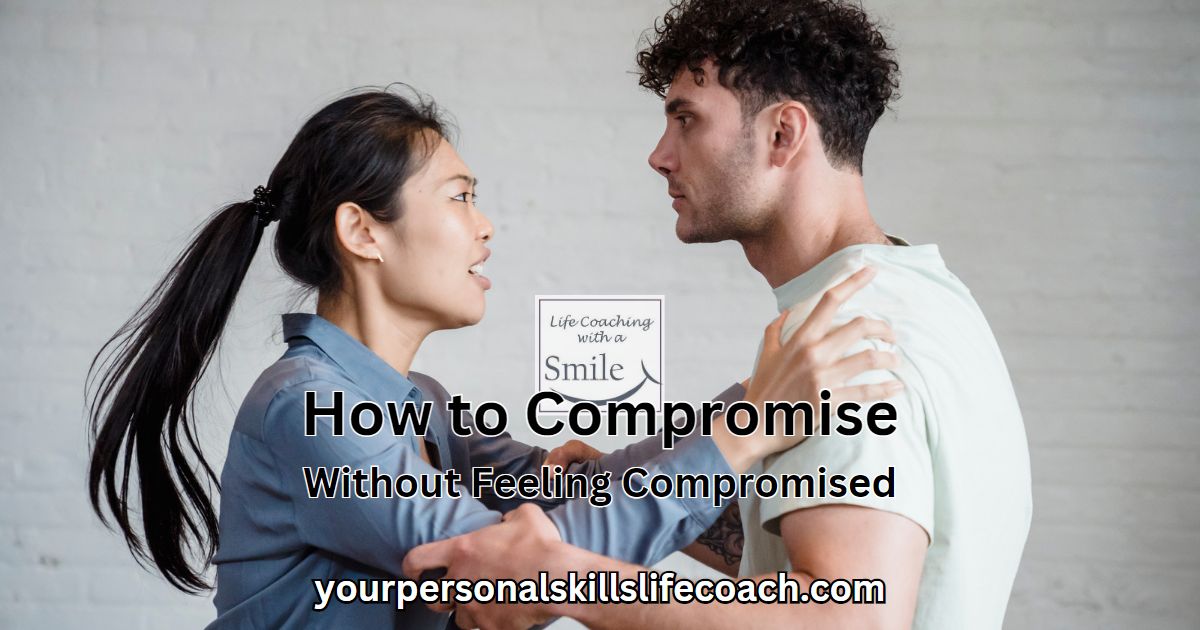The path of relationships is not always smooth. Compromising in relationships is finding the middle ground between you and your partner’s wishes, habits, or preferences. No two people will feel the same about everything. Our differences make friction between people we care about inevitable. Compromise means partners come together for critical decision-making around how they will live together, spend their time, or accomplish chores. In order for that to happen, you must know how to compromise without feeling compromised.
“Marriage is about compromise; it’s about doing something for the other person, even when you don’t want to.”
― Nicholas Sparks, The Wedding
Why Compromise? Why Not?
How do you know your idea is best unless you look at both sides? If you’re not willing to listen to another point of view, are you afraid of something? Overcoming our fears is how we discover our real selves. Are you the kind of person who always wants his own way? Must you always have the upper hand in a relationship? Do you believe that your counterpart can’t make important decisions?
When we question the beliefs that we hold sacred, we can identify flaws in our reasoning. We see the irrational parts of ourselves that we might not have realized. Compromise teaches you a lot about yourself. It helps you grow as an individual.
Why Knowing How to Compromise is Important?
Compromise in relationships is key to each partner’s happiness, well-being, and mental health. Compromising is a way to respect your partner’s feelings. It makes you closer. It enhances mutual trust. Seeing things from your partner’s point of view can also increase your understanding of each other. This is true in social and business friendships as well as romantic relationships.
Think of you and your partner on a teeter-totter. If one partner is always getting their way, the other partner is dangling in the air. When neither partner will give in even a little the teeth-totter is balanced in the middle. That gets boring quickly and one partner is bound to go play somewhere else. Compromise is that teeter-totter moving up and down both partners working together.
Compromise also has personal benefits. Partners willing to compromise also build respect. When couples lead from a spirit of generosity, they can support each other when either partner needs help. Without compromise, couples may drift apart. A lack of compromise can lead to bitterness. One of you might feel like the other is stubborn and selfish. This can make a partner feel used and undervalued.
Compromise Doesn’t Mean Giving Up
Compromise doesn’t mean you completely agree with your partner or vice versa—it’s healthy to maintain your personal values, beliefs, opinions, and preferences while still meeting halfway. Healthy compromise is simply about finding a balance and bridging the gap so both partners feel heard, understood, and can agree to an effective solution.
You are still individuals. You can like baseball and your partner football, you can like jazz and they can like rock. Compromise is about both sides being heard.
Case Study: The Restaurant Compromise
Two friends go to lunch together once each week. One of them chooses the restaurant one week. The other chooses the next week. This is so common and so natural and so fair, it is a compromise that does not even feel like a compromise.
Areas for Compromise
Compromise shows that your relationship is more important than always getting your way. It also shows you’re working together as a couple that wants to make decisions together. Here are a few ideas where compromise might come in handy:
- Vacationing together, apart or alternate
- Spending time with friends and family
- Intimate partners might compromise on areas involving sex
- Talking about money
- Arguing, taking time outs
- Raising children
Learn How to Compromise Without Feeling Compromised
Compromise won’t “just happen”. If you find yourself at odds with your partner, try these seven tips on learning to compromise, and see how they can help improve your relationship.
Don’t always try to be right
We all want to win! It’s understandable that you feel that way, but it’s something you need to stop feeling. When you want to win, you’re not listening to the other side of the argument or conversation. Suspend your need to be right and listen to your partner, friend or coworker.
Let things go
Needing to be right is just the first thing you need to let go of. Don’t hold so tightly to all the past wrongs the person may have done for you. The saying is “Forgive and forget”, not “Forgive but hold a grudge”. Just because you got into a disagreement with your spouse a few weeks ago doesn’t mean it’s relevant to the one you’re having today.
Rethink your expectations
Keep your emotions in check and think about what you really want, both from your life and from the relationship. Is it important you stand your ground so firmly, or would everything still be ok if you gave in a little bit? This is important in all relationships, whether it’s with your kids, your siblings, your partner or your coworkers.
Be willing to change
After you rethink your expectations, be willing to act on the changes as you see fit. It’s one thing to say you’re willing to compromise, but another thing entirely to actually act on that change. A major part of compromising is actually following through with the resolution. This will show others that you’re willing to compromise completely, not just make false promises in order to end a fight.
Share your beliefs and emotions
Compromising is about meeting halfway. You have to know how to compromise without feeling compromised. Don’t forsake yourself and what you believe in in order to be a great compromiser. Make sure that you express your beliefs and emotions about the situation. Everyone involved in the situation needs to be heard. The easiest way to do this is to let both sides clearly and honestly state their views. Use “me” and “I” statements so it’s clear that this is how you feel, and that you’re not trying to force your feelings or opinions on others. If your issue is at work, make sure you don’t over-share your emotions — stay calm, but make sure you’re heard loud and clear.
Show appreciation
No matter the compromise gets resolved, make sure you show your appreciation to other person. Being willing to compromise, instead of fighting until the finish, is an admirable trait. Make sure you show how much you appreciate the other person working with you to find the best solution. Take time to evaluate the solution together and express what you like about it. Being appreciative of the positive social interaction and how working together to find the best solution made you feel.
Keep an open mind
You made it through a compromise intact! How does it feel? Remember this for next time. It’s important to keep an open mind — not only for future compromises, but also in all future interactions. Keeping an open mind, being willing to change your expectations, and not trying to be right in the first place might help you avoid arguments in the future. But even if you can’t — at least you know how to compromise!
At The End Of The Day…
Compromise isn’t easy nor is it something we’re born knowing to do well. Be patient with yourself and your friend or partner. Some compromises are going to challenge your relationship, others may feel easy. Just persevere and be as consistent as you can. Once know how to compromise without feeling compromised in your relationship, you may begin to notice some significant changes. Over time, the word “compromise” won’t feel negative or scary at all, but rather a vital ingredient to your happy union.
Related Article: 8 Ways to Discover More Joy in Your Relationship

